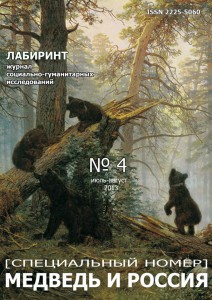THE FUNCTION OF THE BEAR IN BORIS POLEVOI’S STORY ABOUT A REAL MAN
THE FUNCTION OF THE BEAR IN BORIS POLEVOI’S STORY ABOUT A REAL MAN
Author(s): Ursula StohlerSubject(s): Russian Literature, Social development, Social Theory, Sociology of Culture, WW II and following years (1940 - 1949)
Published by: Издатель Наталья Докучаева
Keywords: bear; Russia; socialist realism; modernization; Boris Polevoi; Jack London; adventure stories; forest; pilot; wilderness; survival; Stalinism;
Summary/Abstract: The article „The Function of the Bear in Boris Polevoi´s Story about a Real Man“ by U. Stohler argues that the figure of the bear, as manifested in this Socialist Realist novel, on the one hand epitomizes the notion of wilderness that the Soviets´ efforts to modernize the country tried to overcome, on the other hand it allegorises the disruption of the natural order that the Second World War inflicted on Russia. These functions of the symbol of the bear emerge when we constrast Polevoi´s novel with Jack London´s short story «Love of Live», by which it was probably heavily inspired. As numerous parallels between the two works suggest, Polevoi´s novel may be regarded as a Russian version of London´s well-known short story, written with the goal of developing a Soviet tradition of adventure stories: whereas London´s main protagonist has to fight a wolf in order to survive in the wilderness, the life of Polevoi´s leading character depends on his ability to kill a bear and to avoid transforming himself into a bear-like creature while at the same time maintaining some features typical for a Soviet fighter pilot.
Journal: Лабиринт. Журнал социально-гуманитарных исследований
- Issue Year: 2013
- Issue No: 4
- Page Range: 87-100
- Page Count: 14
- Language: Russian

